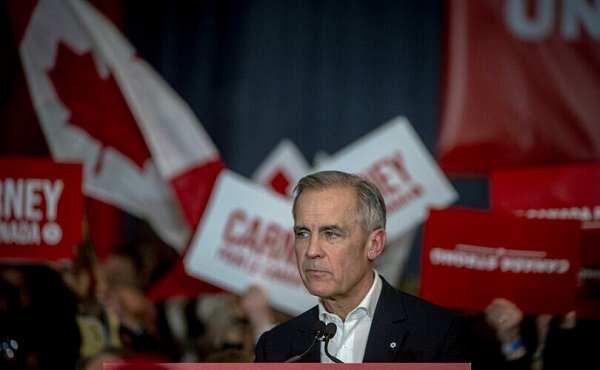Crime
Communist China has been directly interfering in Canadian media via journalists, execs: int’l report

From LifeSiteNews
According to a National Security and Intelligence Committee of Parliamentarians report, China has been interfering with Canadian media content via direct engagement with Canadian media executives and journalists.’
A newly revealed intelligence report is alleging that China has been pressuring mainstream Canadian media in an effort to manipulate the news via “direct engagement” with “media executives and journalists.”
According to a National Security and Intelligence Committee of Parliamentarians (NSICOP) report tabled June 3, the People’s Republic of China (PRC) has been interfering with Canadian media outlets by pressuring them to write favorably about the communist regime.
The report found that China has been “interfering with Canadian media content via direct engagement with Canadian media executives and journalists.”
A summary of six redacted sentences, which “were deleted to remove injurious or privileged information,” described how the PRC interfered with Canadian news.
Examples included “paying to publish media articles without attribution, sponsoring media travel to the PRC, pressuring journalists to withdraw articles and creating false accounts on social media to spread disinformation.”
This is hardly the first time China’s meddling in mainstream media has been exposed. In 2021, Canadian Security Intelligence Service Director David Vigneault warned that foreign interference in media had “become normalized,” especially with ethnic media outlets.
“In particular, PRC media influence activities in Canada have become normalized,” the briefing memo stated.
The report followed a March survey which revealed that the majority of Canadians believe that legacy media journalists and government officials are not trustworthy and are “lying to them” regularly.
Chinese interference in government-funded media is hardly surprising considering Prime Minister Justin Trudeau’s open admiration for China’s socialist regime.
In 2013, Trudeau praised China for its “basic dictatorship” and has labeled the authoritarian nation as his favorite country other than his own.
Beyond influencing the media, China is also alleged to be directly involved in the Canadian electoral process.
In April, the Canadian Security Intelligence Service (CSIS) confirmed that China was working to help elect regime-friendly Canadian MPs.
Later that same month, CSIS director David Vigneault testified that he gave Trudeau multiple warnings that agents of the Communist Chinese Party were going after Conservative MPs, with Trudeau denying he ever got such warnings.
As LifeSiteNews previously reported, details from a “top secret” memo have shown that Trudeau’s office was giving explicit warnings by Canadian intelligence that agents of the CCP were an “existential threat to Canadian democracy.”
As a consequence of these allegations, the Foreign Interference Commission was convened to “examine and assess the interference by China, Russia, and other foreign states or non-state actors, including any potential impacts, to confirm the integrity of, and any impacts on, the 43rd and 44th general elections (2019 and 2021 elections) at the national and electoral district levels.”
The Commission is being headed by Justice Marie-Josée Hogue, who had earlier said that she and her lawyers will remain “impartial” and will not be influenced by politics and began January 29.
In January, Hogue said that she would “uncover the truth whatever it may be.”
Automotive
Dark Web Tesla Doxxers Used Widely-Popular Parking App Data To Find Targets, Analysis Shows


From the Daily Caller News Foundation
By Thomas English
A dark web doxxing website targeting Tesla owners and allies of Elon Musk appears to be compiled from hacked data originally stolen from a massive ParkMobile app breach in 2021, according to records obtained by a data privacy group.
The site, known as DogeQuest, first appeared in March and publishes names, home addresses, contact details and other personal information tied to Tesla drivers and DOGE staff. Marketed as a hub for anti-Musk “creative expressions of protest,” the platform has been linked to real-world vandalism and remains live on the dark web. Federal investigations into DogeQuest are already underway, the New York Post first reported.
“If you’re on the hunt for a Tesla to unleash your artistic flair with a spray can, just step outside — no map needed! At DOGEQUEST, we believe in empowering creative expressions of protest that you can execute from the comfort of your own home,” the surface-web DogeQuest site reads. “DOGEQUEST neither endorses nor condemns any actions.”

A screenshot of the DogeQuest surface website captured on April 3, 2025. (Captured by Thomas English/Daily Caller News Foundation)
ObscureIQ, a data privacy group, compiled a breakdown of the data — obtained by the Daily Caller News Foundation — and determined 98.2% of records used to populate the site matched individuals affected by the 2021 ParkMobile breach.
Encouraging destruction of Teslas throughout the country is extreme domestic terrorism!! https://t.co/8TCNIbrQxA
— Elon Musk (@elonmusk) March 18, 2025
DogeQuest originally appeared as a surface web doxxing hub, encouraging vandalism of Teslas and displaying names, addresses, contact details and, in some cases, employment information for roughly 1,700 individuals. The site used stolen ParkMobile records along with data purchased from brokers, flagging anyone who had a Tesla listed in their vehicle registration profile, according to ObscureIQ’s analysis.
The platform — now operating as “DogeQuest Unleashed” via a .onion dark web address — has also published personal details of high-value targets including senior military officials, federal employees and private sector executives in Silicon Valley. A spreadsheet reviewed by the Daily Caller News Foundation indicates several individuals targeted work areas like cybersecurity, defense contracting, public health and diplomatic policy. DOGE staff and their families appear prominently throughout the data.

A screenshot of DogeQuest’s surface website, captured on April 3, 2025. (Captured by Thomas English/Daily Caller News Foundation)
No other reporting has yet tied DogeQuest directly to the ParkMobile breach, which impacted over 21 million users in 2021. The company, which facilitates cashless parking across the U.S., quietly disclosed the breach in April of that year, admitting that “basic user information” had been accessed. ObscureIQ’s research shows that exposed data included email addresses, license plate numbers and phone numbers — enough to triangulate identity when paired with commercial data brokers.
The company agreed to a $32 million settlement to resolve a class-action lawsuit stemming from the data breach. The lawsuit alleged that ParkMobile failed to secure its Amazon Web Services cloud storage, allowing access to the data. Although payment data were reportedly not compromised, plaintiffs argued the exposed information still posed serious privacy risks — a claim now reinforced by its use in the DogeQuest doxxing campaign.
Despite federal attention, the site has proven difficult to keep offline, as the dark web mirror incorporates anonymized hosting methods, frustrating law enforcement takedown efforts.
The Department of Justice charged three suspects last week linked to physical attacks on Tesla vehicles, charging stations and dealerships across multiple states, though it has not publicly confirmed any link between those suspects and DogeQuest. Meanwhile, the FBI has acknowledged it is “actively working” on both the doxxing campaign and a parallel rise in swatting incidents affecting DOGE affiliates.
Crime
Europol takes out one of the largest pedophile networks in the world with almost 2 million users

From LifeSiteNews
An international group of police agencies has taken down one of the largest pedophile networks in the world with almost two million users.
Investigators from Bavaria, Germany, announced yesterday that they dismantled an online pedophile platform called “Kidflix” used to distribute child pornography that had around 1.8 million users worldwide. Police carried out raids in 31 countries and arrested 79 people in total.
The European police unit Europol coordinated the operation led by the Bavarian criminal police. Europol announced that around 1,400 suspects have been identified worldwide in “one of the biggest blows against child pornography in recent years, if not ever.”
According to Europol, the platform “Kidflix” was one of the largest pedophile networks in the world. Guido Limmer, deputy head of the Bavarian criminal police, said it was the “largest operation ever” organized by Europol. The platform’s server, with over 70,000 videos at the time, was reportedly shut down by German and Dutch authorities in early March.
The 79 people arrested were not only suspected of having watched or downloaded videos of child sexual abuse but some were also suspected of personally harming children. The police units carried out the raids from March 10 to 23 and reportedly confiscated thousands of electronic devices. In Germany alone, 96 locations were raided. Among the suspects was a 36-year-old man who not only viewed illegal material but also reportedly offered up his young son for sexual abuse. The child was given to child protection services after the man was arrested, the Bavarian police spokesman said.
Limmer also noted that one of the arrested suspects was a “serial” abuser from the United States.
According to Europol, “Kidflix” was set up by cybercriminals in 2021 and became one of the most popular platforms for pedophiles. The international police agency said that the investigation into the network began in 2022.
In October 2024, German police dismantled another large online pedophile network with hundreds of thousands of users, arresting six men associated with the platform.
Last year, Germany’s Federal Criminal Police Office revealed that the cases of sexual abuse against children and adolescents had more than tripled in the past five years.
-

 John Stossel2 days ago
John Stossel2 days agoGovernment Gambling Hypocrisy: Bad Odds and No Competition
-

 2025 Federal Election1 day ago
2025 Federal Election1 day agoCommunist China helped boost Mark Carney’s image on social media, election watchdog reports
-

 2025 Federal Election1 day ago
2025 Federal Election1 day agoFifty Shades of Mark Carney
-

 2025 Federal Election2 days ago
2025 Federal Election2 days agoMark Carney pledges another $150 million for CBC ahead of federal election
-

 Alberta2 days ago
Alberta2 days agoAlberta’s embrace of activity-based funding is great news for patients
-

 Energy24 hours ago
Energy24 hours agoTrump signs four executive orders promoting coal industry
-

 2025 Federal Election1 day ago
2025 Federal Election1 day agoConservative Party urges investigation into Carney plan to spend $1 billion on heat pumps
-

 2025 Federal Election14 hours ago
2025 Federal Election14 hours agoRCMP memo warns of Chinese interference on Canadian university campuses to affect election









